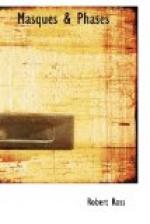laughter. Some of the admirers, with the generosity
of youth, nobly came to the rescue. They made
a paper war and talked of “The cruelty and cowardice
of the attack,” “The stab in the dark,”
“Journalistic marauding,” “Disappointed
author turned critic.” The slate was one
that I am bound to say was
killing in both senses
of the word. A book less worthless could never
have lived under it. It was one of those decisive
reviews of all ages.
Prejudices was withdrawn
by the publisher fearful of damaging his prestige.
Yet it was never looked on as a rarity, and fell
at book auctions for a shilling, for some time after,
amidst general tittering. The daily papers meanwhile
devoted columns to the discussion. I telegraphed
to Burrage in cipher and congratulated him, knowing
that secrets leak out sometimes through the post office.
I was surprised to get no reply for some weeks, but
Curtis said he was lying low while the excitement
lasted. One day I got a letter simply saying,
“For God’s sake come. I am very ill.”
I went at once. How shall I describe to you
the pitiful condition I found him in? The doctor
told me he was suffering from incipient tuberculosis
due to cerebral excitement and mental trouble.
When I went in to see him he was lying in bed, pale
and emaciated as a corpse, surrounded by friends and
relations. He asked every one to go out of the
room; he had something of importance to say to me.
I then learned what you have divined already.
The anonymous author of
Prejudices was no other
than Quentin Burrage himself. Or rather not
himself, but the other self of which neither I nor
Curtis knew anything. He had been living a double
existence. As a writer of trashy essays and
verse, an incomplete sentimentalist surrounded by
an admiring band of young ladies and gentlemen, he
was not recognised as the able critic and the anonymous
slater of the “Acropolis.”
’When he first received his own book for review
he recalled the words of Curtis. He must be
honest, impartial, and just. No one knew better
the faults of Prejudices. As he began
to write, the old spirit of the slater came over him.
His better self conquered. He forgot for the
moment that he was the author. He hardly realised
the sting of his own sarcasms even when he saw them
in proof. It was not until it appeared, and
the papers were full of the controversy, that the cruelty
and unfairness of the attack dawned on him.
I was much shocked at the confession, and the extraordinary
duplicity of Burrage, who had been living a lie for
the last ten years. His denunciation of poor
Curtis pained me. I would have upbraided him,
but his tortured face and hacking cough made me relent.
I need not prolong the painful story. Burrage
never recovered. He sank into galloping consumption,
only aggravated by a broken heart. I saw him
on his deathbed at Rome. He was attended by
Strange, and died in his arms. His last words
to me were, “Rivers, tell Curtis I forgive him.”




